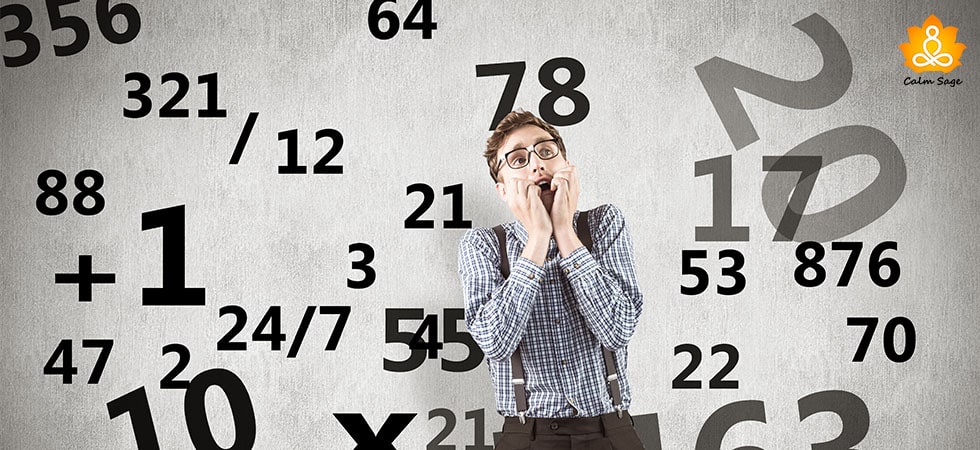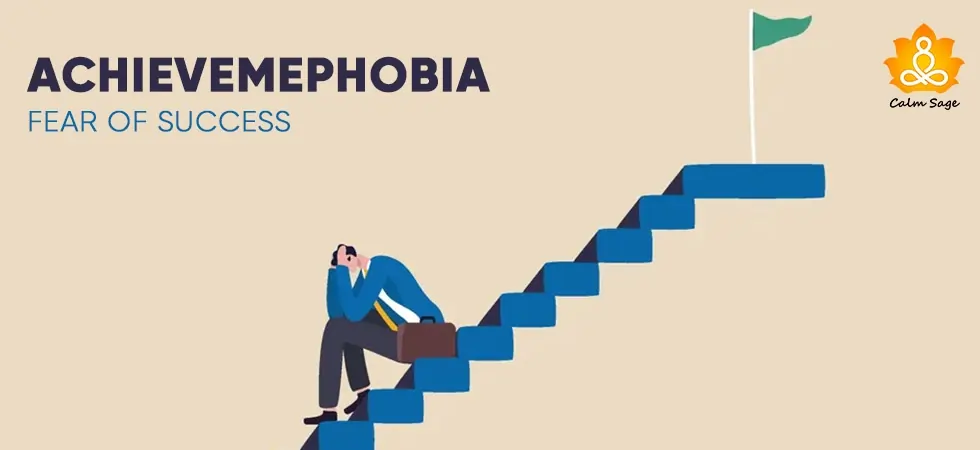Arithmophobia (Fear Of Numbers): Symptoms, Causes, Treatment, Self-Help, And More

Can people develop a fear of numbers? Well, yes, not all numbers, certain numbers can have an impact on someone’s life. For some people, number 5 can be a lucky one while for others it can be fearful.
Such a type of fear of numbers is called arithmophobia or numerophobia in psychology. This type of specific fear can have negative impacts on the overall well-being of people.
People struggling with arithmophobia are not able to hold on to a job, maintain a budget, or pay bills. In this blog, let us take a deep look at what is arithmophobia, its symptoms, causes, treatment, and more. So, let’s get started!
What is Arithmophobia?
A specific and extreme fear of numbers is called arithmophobia. People living with arithmophobia might develop a fear of specific numbers or all numbers. This is why this fear is also known as numerophobia. As of now, arithmophobia is not listed in the Diagnostic and Statistical Manual of Mental Health Disorders 5th Edition (DSM-5).
Still, the fear of numbers is considered under the specific phobias list as someone struggling with the fear of numbers can experience irrational or extreme fear which can disrupt the overall quality of life. One of the most affecting parts of arithmophobia is that it can challenge professional and personal opportunities.
The consequences of arithmophobia can be real and challenging as research shows that 27% of people are likely to die of a heart attack on the date 4 of every month. The study is based on a superstition that the psychological stress of the coming of an unlucky day can increase the risk of heart attacks.
Meanwhile, arithmophobia in children can show up differently as children struggle more with the fear of mathematics or numbers as they can become very complicated and difficult in the future.
Therefore, if you think your child is struggling with arithmophobia, it is likely to be developed because of mathematics and not because of a specific number or a number phobia.
Facts About Arithmophobia
1. In some extreme cases, arithmophobia is also rooted in religious beliefs or superstitions. For example, in Christianity, the number 13 is connected with a lot of biblical traditions, and the fear associated with the number 13 is called triskaidekaphobia.
2. The number 666 is connected with a weird fear in Western cultures as the number 666 is known to be a number of beasts. For example, a Former President from Los Angeles changed his home number from 666 to 668.
3. The number 4 is considered to be a lucky number in Asian countries such as Japan, Vietnam, and China as it is something related to homophones in the local languages. Similarly, in Western countries, people have a fear of the number 4 which is why the serial numbers of cameras, phones, or other models do not consist of number 4 as people are prone to the fear of the number 4.
4. A lot of people hate mathematics and this hatred can induce some level of anxiety in people, however, such a level of anxiety does not equate to a phobia.
5. A person is likely to get diagnosed with arithmophobia only when the fear is intense and persistent and can far exceed the danger.
6. It’s important to learn the facts about arithmophobia as they can help people get the right diagnosis and treatment.
Other common phobias associated with arithmophobia:
- Dodecaphobia: Fear of number 12
- Octophobia: Fear of number 8
- Triskaidekaphobia: Fear of number 13
Symptoms of Arithmophobia
Below listed are some of the common symptoms of arithmophobia in adults or children:
- Chills
- Dizziness
- Dry mouth
- Excessive sweating
- Extreme anxiety
- Extreme shaking or trembling
- Fainting
- Headache
- Hyperventilation
- Increased blood pressure
- Indigestion
- Nausea
- Racing heart or heart palpitations
- Shortness of breathing
Some of the extreme symptoms of arithmophobia can include:
- Depression
- Social isolation or withdrawal
- Shame and guilt
Causes of Arithmophobia
As of now, there’s no clear reason behind the development of arithmophobia. Below listed are some factors that might play an important role in the development of arithmophobia:
- Genetics: Genetics plays an important role in the development of arithmophobia as a history of anxiety disorders or specific phobias gets passed through genetics.
- Presence of mental health conditions: The presence of mental health conditions such as generalized anxiety disorder (GAD) can have an impact on the development.
- Past experiences: Some negative experiences related to numbers can also have an impact on the development. For example, a child being bullied or scolded for not scoring well in mathematics might be prone to developing arithmophobia.
Diagnosis and Treatment of Arithmophobia
If you think you or your loved one might be affected by the fear of numbers or arithmophobia, it’s always better to connect with a registered and experienced mental health professional to seek proper diagnosis and treatment.
To connect with a mental health professional through online platforms, click below:

Great for a large network of licensed therapists
-
$60 to $90/week, billed every 4 weeks
-
Therapy via messaging, phone, or live video chat
-
Flexible cancellation at any time
20% off your first month

Great for CBT Based therapists
-
$40/week, billed every 4 weeks
-
Therapy via messaging, phone, or live video chat
-
Specialization for CBT based Therapy
20% off your first month

Best for Treatment Plants
-
$60 to $90/week, billed every 4 weeks
-
Therapy via messaging, phone, or live video chat
-
Flexible cancellation at any time
$100 off your first month with code SPACE
The diagnostic process of an individual or client only meets the criteria when the fear is persistent and intense and can far exceed the danger. Overall, the symptoms must be impacting the overall quality of life. Below listed are some of the important criteria for the diagnosis of arithmophobia:
- The symptoms of arithmophobia must be out of proportion and can result in any real danger.
- The symptoms of arithmophobia must be causing significant stress and disruption to the overall quality of life.
- The intense fear must be causing psychological effects and the symptoms must last for more than six months.
- Extreme avoidance developed by looking or thinking of numbers
Coming forth to the treatment process, below are the common therapy systems generally prescribed for treating arithmophobia:
1. Cognitive behavioral therapy (CBT)
CBT is one of the effective treatment methods for treating arithmophobia as it helps in reducing negative thoughts and replacing them with positive ones. Additionally, it also helps in learning healthy coping mechanisms that retrain your brain to adapt numbers or learn mathematics positively.
2. Exposure Therapy
Exposure therapy is the first-line treatment for specific phobias such as arithmophobia. Exposure therapy is all about slowly exposing yourself to the source of fear. In cases of arithmophobia, a mental health professional or a psychotherapist might show some numbers or work on numbers that gradually help in practicing numbers in real life.
3. Hypnotherapy
Hypnotherapy revolves around guided relaxation and concentration in a session wherein the psychotherapist helps in reaching a peaceful mind state. Hypnotherapy is one of the effective treatment options for treating arithmophobia.
**In some extreme cases medications might also be prescribed. Anti-anxiety medications or antidepressants are generally used to treat some specific symptoms. As of now, there’s no specific medication for curing arithmophobia.
Frequently Asked Questions
1. How to prevent arithmophobia?
Living a healthy lifestyle, eating a nutrient-dense diet, avoiding dehydration, managing stress, and learning healthy coping techniques can help prevent arithmophobia in adults and children.
2. How do I get over arithmophobia?
Arithmophobia can be effectively treated by psychotherapy, however, consistent exercising, deep breathing exercises, and mindfulness-based strategies can help reduce anxiety and stress and help in overcoming arithmophobia.
3. How rare is arithmophobia?
Arithmophobia is not a newly discovered phobia, it is one of the common phobias that is usually experienced by a lot of people during maths class or it can also be associated with superstitions or religious beliefs. As of now, I could not find much data or research. The exact prevalence of arithmophobia is still unknown.
I hope this blog helps you understand arithmophobia and overcome it. For more such content, connect with us through all social media platforms.
Thanks for reading!




















